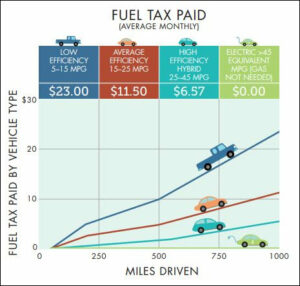
From a purely economic perspective, the ideal system for funding road and highway improvements would be a Mileage Based User Fee (MBUF) in which motorists would pay in direct proportion to which they use the public road network. Charging for road usage would incentivize Virginians to drive less, thus reducing both congestion and carbon emissions. Plus, an MBUF (also known as a Vehicle Miles Driven tax) would replace Virginia’s increasingly antiquated and jury-rigged system of transportation funding that relies on retail and wholesale gasoline taxes, sales taxes, motor vehicle registrations, and other revenue sources that transfer wealth from low-mileage drivers to high-mileage drivers.
Aside from the fact that such a system would create winners and losers, which would complicate a political implementation, the idea of a VMT tax has been beset by practical issues. How would the technology work and how much would it cost to administer? How could peoples’ privacy be protected? And how does one account for inter-state travelers — if Virginia couldn’t collect the tax from out-of-staters using state roads and highways, would such a system unfairly burden Virginia taxpayers?
But the idea is gaining new respectability. The I-95 Corridor Coalition, a partnership of more than 100 state transportation agencies, toll authorities, and public safety organizations, is exploring the feasibility of establishing MBUFs. If Virginia converted its 22.39 cents-per-gallon gasoline tax and 26.08-cents-gallon diesel tax to an MBUF on a revenue-neutral basis, it would have to charge 1.02 cents per mile. (That compares to the IRS mileage tax allowance of 58 cents per mile.)
According to the coalition website, studies so far have included two phases.
Phase 1. A pilot project in Delaware found that 20% of the miles driven were outside the state where the participant lived, confirming that dealing with out-of-state mileage is important. According to the Coalition, the study also showed that it is feasible for MBUF technology to collect tolls. Concerns about “privacy of my personal data” dropped as a high concern among participants from 57% before the study to 30% afterwards.
Phase II. A second study phase is focusing on the special challenges of motor freight carriers. These heavy road users pay a significant share of the cost of building and maintaining roads and highways (although some would say not enough). Commercial vehicles must adhere to a long list of regulations, including Electronic Logging Devices, the International Fuel Tax Agreement, and the International Registration Plan. A goal of the study is to determine how easily it would be integrate mileage-based fees with existing rules.
An expanded, third phase is now underway. As part of that study, the I-95 Corridor Coalition is teaming up with Transurban, Virginia’s partner in Northern Virginia’s Interstate 495 and Interstate 95 express lanes, to see how a per-mile tax would work alongside toll lanes. Transurban hopes to include about 400 drivers from across the D.C. region, reports WTOP TV.
New technologies are making MBUFs a more attractive prospect than they were a decade ago when Bacon’s Rebellion was pushing the idea for Virginia. States the coalition website:
With watches, phones, ride hailing apps, and on-demand services, we are more connected and more demanding than ever before. Currently, tons of information is sitting within our vehicle, but remains out of reach for most drivers. Value-added amenities break down the barrier between the vehicle and driver by creating tools such as a battery life monitor, check engine message decoder, trip logs and vehicle safe zones. The same technology used to create these value-added amenities can also calculate a mileage-based user fee. The relationship between value-added amenities and MBUF is being explored in pilot studies.
Technology can make it easier to track battery voltage and health. Insurers can reward drivers for safe driving habits. Motorists can gain information about their driving habits that can guide them to more fuel-efficient driving. Parents can set up geographic “safe zones” and receive notifications if their teen drivers cross them. If MBUF proponents can pitch the fees as a value-add rather than a privacy concern, the political prospects would improve immeasurably.

Leave a Reply
You must be logged in to post a comment.